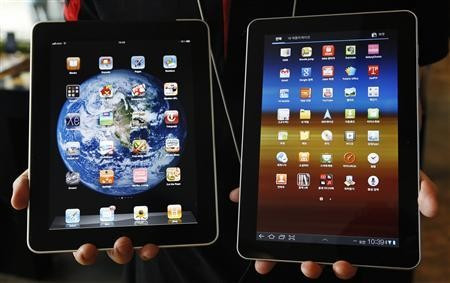Samsung Galaxy Tab 10.1 Sales Ban Lifted
iPhone 5 added to patent infringement case
A preliminary sales ban requested by Apple on the Samsung Galaxy Tab 10.1 in America has been lifted, but the iPad maker can still win a permanent ban at a hearing in December.

Back in June, Judge Lucy Koh granted a preliminary US sales injunction based on the likelihood that the Galaxy 10.1 Tab infringed on Apple's iPad hardware design patent, but, while the jury found it to infringe on Apple's intellectual property, the cited hardware design patent was this week found not to be infringed upon.
"We are pleased with the court's action today, which vindicates our position that there was no infringement of Apple's design patent and that an injunction was not called for," Samsung said in a statement on 1 October.
Last month Judge Koh cited a lack of jurisdiction as the reason for her being unable to lift the sales ban sooner, but added that Samsung's request to have it lifted raised a "substantial issue."
The US sales ban of the Galaxy Tab 10.1 was due to an alleged infringement of Apple's D504,889 patent, which describes a tablet device with a thin bezel, outer edge border, rounded corner, edge-to-edge front glass and minimal aesthetics on the front, sides and back.
Once Judge Koh had jurisdiction handed back to her by the Federal Court the injunction on "making, offering to sell, selling or importing" the Galaxy Tab 10.1 to the US was lifted.
But the Tab 10.1 could still be banned for good, if Apple prevails at a further hearing on 6 December. Patent expert Florian Mueller explains that Apple could win a permanent injunction "over the D'889 tablet design patent if [Apple] prevails on the related part of its Rule 50 ('overrule-the-jury') motion".
Samsung adds iPhone 5 to patent infringement hit list
An hour before Judge Koh's order, Samsung formally filed a request in the parallel case against Apple in California to add the iPhone 5 to the list of products accused of infringing eight Samsung patents.
Samsung had already informed the court on 20 September - a day before the iPhone 5 went on sale - that it intended to include the new model in its ongoing case against older versions of the Apple device.
The 1 October filing by Samsung states that as soon as the iPhone 5 was available for purchase, Samsung began its investigation of the product and within a week determined that the iPhone 5 used the same Samsung-patented technologies as previous models.
Samsung told the court that it would be more efficient to include the iPhone 5 in the same countersuit against Apple as older models, rather than set up a fresh case.
The South Korean company said: "The iPhone 5 has the same accused functionality as the previously accused versions of the iPhone, so the proof of infringement of the patents-in-suit by the iPhone 5 is the same as for other Apple devices already accused of infringement in this litigation."
Samsung believes that the iPhone 5 - as with older models - uses the company's standards-essential patents without permission, and also infringes on some designs patents.
The case will be next heard on 6 November, when the iPhone 5 will formally be added to the list of allegedly infringing Apple device. As before, the hearing will take place in a California court and will be presided by Judge Paul Grewal.
© Copyright IBTimes 2025. All rights reserved.






















